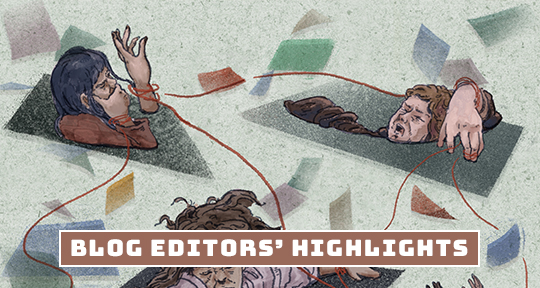The Summer 2022 Issue is our forty-fifth edition, featuring work from thirty-one countries! From newly translated fiction by luminaries such as Elfriede Jelinek and Thomas Bernhard, to our special feature highlighting Swiss literature, and to probing essays that interrogate the adoption of new languages, these intricately linked writings feature characters who are thrown into abysses both personal and political but discover moments of solace, communion, and revelation. To introduce you to another rich, wide-ranging issue, our blog editors discuss their favorite pieces.
In Elisa Shua Dusapin’s 2021 National Book Award-winning novel, Winter in Sokcho, translated by Aneesa Abbas Higgins from the French, the unnamed narrator, a young French Korean woman living on the border between North and South Korea, experiences an ongoing crisis of identity due her inability to be seen, displacement, and strained relationships with her domineering mother and absent boyfriend. In the novel, the narrator seeks to recover a self that has been rendered invisible. One of Dusapin’s most fitting metaphors for this reassembling of the self is the narrator’s constant search for her reflection in the mirror of the guesthouse where she works. Similarly, the search for a true reflection emerges as a central theme in the introspective Summer 2022 issue. It is apt in these precarious times when the stability of the self is being shaken by forces of displacement and politics that this issue deeply reckons with fixing selves that have been lost, falsely performed, and fractured. The building of the self is literalized by Lu Liu’s playful yet melancholy cover art, in which two boys nervously construct a sand tower out of words, alluding to the Tower of Babel made personal in Jimin Kang’s moving essay, “My Mother and Me.”
The mirror is the object of Andrea Chapela’s kaleidoscopic, multidisciplinary self-inquiry, “The Visible Unseen,” elegantly rendered by Kelsi Vanada. It adopts the fragmentary form of a series of failed beginnings, in the manner of Janet Malcolm’s famous essay on David Salle, Forty-One False Starts. Chapela’s variation of the form represents the difficulty of locating the self in one’s reflection. By extension, Chapela argues that at a given time, the self can never be completely isolated; rather, it can only ever be seen through a particular type of mirror, at a certain angle, beneath a certain light, yielding a fragment of the whole. Just as Chapela scrutinizes the mirror through a variety of perspectives—scientific, literary, philosophical, memoiristic—so must we be as comprehensive yet fragmentary when we search for ourselves. As Chapela writes, “Little by little, I start to accept that each new beginning of the essay is just one piece of the full picture.”




